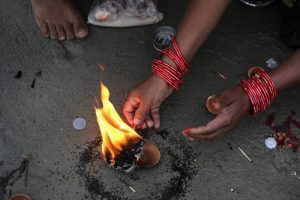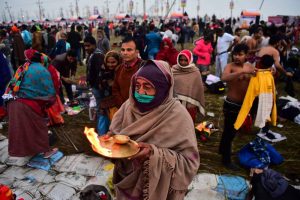India : Tens of thousands of Hindus, led by heads of monasteries and ash-smeared ascetics, waded into the frigid waters of the Ganges River in northern India on Friday despite rising Covid-19 infections in the country.
Hindu pilgrims congregated at the Sangam, the confluence of three rivers — the Ganges, the Yamuna and the Saraswati — in Prayagraj city, 200 kilometres north-east of Lucknow, state capital of Uttar Pradesh, to participate in the Magh Mela festival, one of the most sacred pilgrimages in Hinduism.
They bathed in the Ganges waters, a ritual Hindus believe will wash away their sins and free them from the cycle of death and rebirth.
A similar gathering at a Hindu festival last year in the Himalayan town of Haridwar in neighbouring Uttarakhand state became what epidemiologists call a “superspreader event”, leading to a massive spike in cases.
Coronavirus infections, fuelled by the Omicron variant, are rising fast throughout India. The country reported over 264,000 new infections on Friday but hospital admissions remain relatively low.
Millions of Hindus are expected to attend the festival over the next 47 days. Many of them will stay on the banks of the Ganges for a month.
The situation has raised concerns that the pilgrims could be infected with Covid-19 during the festival and bring the virus back to their cities and villages.
A total of 77 policemen and 12 cleaning staff working at the event have already tested positive for the virus.
“This is going to be a super spreader,” said Utkarsh Mishra, a lawyer who has filed a petition in the Allahabad High Court asking that the festival be cancelled.
Critics of Prime Minister Narendra Modi and his Hindu-nationalist Bharatiya Janata Party say the festival has been allowed to go forward because the government is not willing to anger Hindus — the party’s biggest supporters — before crucial state elections in Uttar Pradesh.
TN





